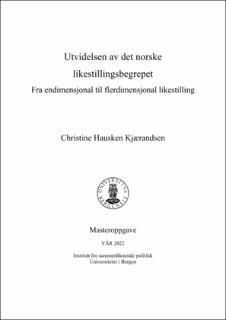Utvidelsen av det norske likestillingsbegrepet – Fra endimensjonal til flerdimensjonal likestilling
Master thesis
Permanent lenke
https://hdl.handle.net/11250/3006007Utgivelsesdato
2022-06-22Metadata
Vis full innførselSamlinger
- Master theses [113]
Sammendrag
This thesis seeks to investigate the concept of «State feminism», and the degree of impact it has had on the Norwegian equality politics since the 1970s. The aim of the analyzes is to assess Norwegian equality policies today, in the light of the feminist/gender-theoretical critique: Has Norway been able, with the «new» Equality and Discrimination Act of 2017 (status quo), to address the challenges outlined by the gender theorists? The research questions the dissertation wants to answer are (1) What is State feminism? (2) How has State feminism influenced Norwegian equality policy? (3) What can we do to improve the equality policy, in relation to recent feminist critiques? Associated with point 3, the intention is to discuss what kind of gender equality policy is more in line with the critical objections directed at state feminism, not a normative discussion of how gender equality policy should be. Through this discussion, the thesis tries to reveal whether the «new» Equality and Discrimination Act of 2017 has taken into account the critical remarks that have been directed at state feminism. The thesis uses two methods to investigate this topic: (1) a document analysis of the Gender Equality and Discrimination Act, in addition to selected documents and reports, and (2) qualitative interviews of experts, in other words stakeholders with political influence on gender equality policy. My analysis shows that the Norwegian concept of (gender) equality has expanded: from one-dimensional to multidimensional equality – it has been transformed from a struggle for gender equality to a struggle for equality and diversity, where the intention is to include as many groups as possible. In other words, the concept of gender equality has changed, and new concepts have been taken in under the equality-umbrella. The dissertation argues that the Norwegian equality policies and legislation have partly recognized the feminist criticism. However, in the process of including more and more grounds for discrimination under the same legislation (the Gender Equality and Discrimination Act of 2017), gender equality has been forgotten. In the future, a focus on gender equality must be taken into account – because in order to ensure equality for «everyone», you have ensure (real) equality for women.
